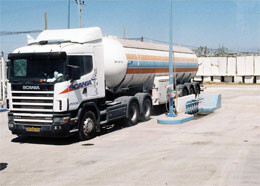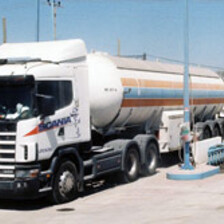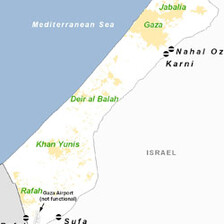The Electronic Intifada 23 April 2008

The Nahal Oz fuel crossing is only open intermittently. (Shabai Gold/IRIN)
An Israeli official told IRIN about one million liters would be sent in, provided no “security incidents” took place. The plant said it needed about 3.5 million liters a week, though Israel has committed to transferring only 2.2 million.
The amount sent in on 23 April could only be spun out for a few days.
Speaking to reporters in Gaza, UN Special Coordinator for the Middle East Peace Process Robert Serry called on Israel to restore sufficient fuel supplies to Gaza and allow the passage of humanitarian and commercial goods.
“The collective punishment of the population of Gaza, which has been instituted for months now, has failed,” Serry said.
He made his comments following an announcement by John Ging, the head of the UN agency for Palestinian refugees UNRWA in Gaza, that his organization and the World Food Program would have to stop distributing food due to the shortage of fuel for their vehicles.
He said flour mills were set to run out of fuel. Many ambulances had been forced to remain idle as they lacked petrol, the central pharmacy was in dire need of fuel for refrigeration, and rubbish continued to pile up in the streets as refuse trucks were unable to move.
“We need everyone to act responsibly and make the well-being of the civilian population their first priority,” Ging said, adding that water and sanitation services were also being affected.
Call for end to Palestinian attacks
The Nahal Oz fuel crossing had only been open for a few hours on two days since a 9 April attack by Palestinian militants, in which two Israelis working for the fuel importing company were killed.
Serry called for an end to the attacks, saying they only prolonged the blockade on the enclave.
Israeli officials have increasingly been expressing frustration as the border crossings, through which vital supplies are transferred, have again in recent weeks become the target of attacks.
Israel is only allowing in a trickle of goods, including fuel in small quantities and basic food and medical supplies. All exports are banned, which, combined with the prohibition on importing raw materials, has brought the private sector to its knees. Human movement out of the Strip is limited to urgent medical cases.
Strike
Complicating matters is the continuing strike by fuel importers, who are refusing to bring in fuel, except for cooking gas and industrial diesel.
“They are also to blame for the lack of fuel in Gaza, but they also have good reasons to strike,” said an aid worker who is deeply involved in the fuel crisis, noting that nearly one million liters of fuel were sitting at the depot waiting for the strike to end.
The fuel association has said it would not import small quantities, as this placed the private sector in the position of trying to distribute crumbs to all its clients, including hospitals and regular petrol stations.
Also, while Israel officially said it would let in cooking gas, Palestinians in Gaza said none was sent in on 23 April and supplies were running out.
This item comes to you via IRIN, a UN humanitarian news and information service, but may not necessarily reflect the views of the United Nations or its agencies. All IRIN material may be reposted or reprinted free-of-charge; refer to the copyright page for conditions of use. IRIN is a project of the UN Office for the Coordination of Humanitarian Affairs.
Related Links

